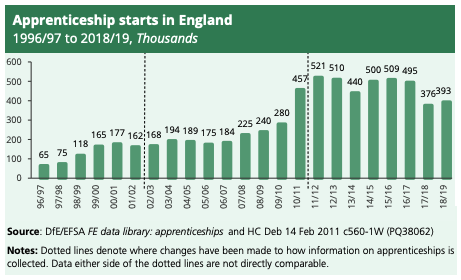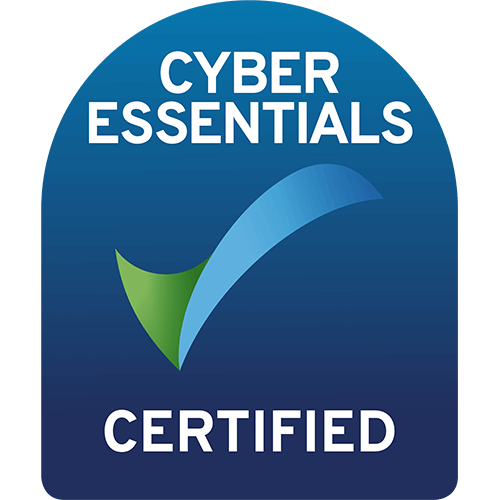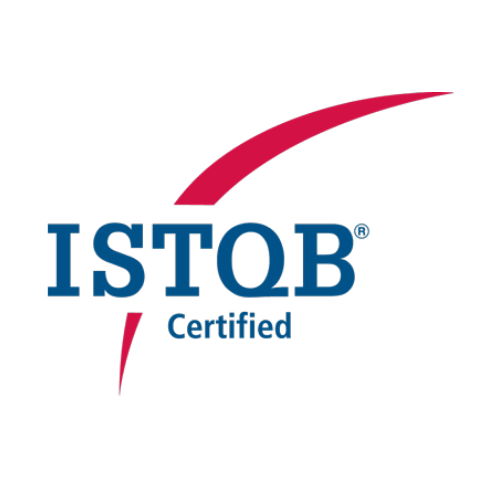What is an apprenticeship?
An apprenticeship is a career opportunity where a person receives on the job experience and training while also pursuing a formal qualification for a particular craft at the same time.
History of Apprenticeships
Traditionally, in an apprenticeship, a master would employ an apprentice to learn from them directly through study and practice. In order to complete their apprenticeship, apprentices were required to produce a “masterpiece”, to demonstrate all that they had learned in their craft. Famous apprentices from this definition include: Leonardo da Vinci, Sandro Botticelli and Josiah Wedgwood.
Over the years, this “classical” definition of apprenticeship was used by engineering companies to train up its next generation of employees. Examples of these include Ransomes and British Telecom, companies who would invest heavily in the development of their employees so that they stayed at the company.
However, apprenticeships started to dwindle as employer focus shifted onto those with university degrees. Over time, they came to realise that their workforce was ill-prepared and so apprenticeships grew in popularity again, with the rise of the “modern apprenticeship”. This type of apprenticeship offers qualifications (e.g. NVQ, BTEC) in tandem with on-the-job knowledge and mentoring.
This apprenticeship is heavily dependent on employers and the training and opportunities they are willing to impart on their apprentices. This is worth considering as many of those taking on apprentices were not apprentices themselves, and are therefore less likely to see the value of an apprenticeship.
The modern focus is now on degree apprenticeships, combining the best of both: academic training in tandem with building practical skills and crafts in the workplace. In this case, the academic training offered is a Bachelor’s degree in that discipline that is afforded to students with no cost to them. This is one of the many factors that draws people to apprenticeships over purely academic qualifications.
| Apprenticeship Level | Grade Equivalent |
|---|---|
| Intermediate | Five good GCSE passes |
| Advanced | Two A-Level passes |
| Higher | First stage of Higher Education (e.g. Foundation Degree) |
| Degree | Bachelors/Masters Degree |
Source: https://www.prospects.ac.uk/jobs-and-work-experience/apprenticeships/what-is-an-apprenticeship
Benefits of an Apprenticeship for Candidates
Other than academic qualifications, what else draws people to complete and apprenticeship?
Respect and ability to work independently
It is often cited that the respect gained from being able to work independently is something that appeals to many candidates: a lot of trust is placed on them by employers, and the right people find that this makes them flourish.
Full-time employee benefits
As apprentices expect to be treated as full-time employees, they also rightly get their benefits: up to 28 days of holiday a year as well as the experience of being in a workplace three years before those who pursue a purely academic route.
Employability increases due to experience
Apprentices also become far more employable afterwards, should they choose to move companies or even departments within the same company due to the level of on-the-job experience gained.
Apprenticeship related discounts
Outside of work, apprentices can benefit from discounts, provided both by the National Apprenticeship Service and the higher education institutions in which they enrol. For example, the National Union of Students also offers exclusive discounts for apprentices with a red card.
Opportunity for local engagement
Apprentices also have more opportunity to give back to their communities, be they local charities or student life. They have the chance to do good for others by volunteering, such as by running careers fairs or helping in local community projects. Such opportunities are afforded to apprentices first, if not to them exclusively.
Ability to explore interests and passions
If you are passionate about something, then apprenticeships could be for you. Studying for a degree whilst working to fulfil your passion allows you space to explore your interests. However, if you’re not sure what to do, an apprenticeship can help you discover if that is what you want to do: it provides you with a view of what work in that industry is actually like on a daily basis and what study is required. If it’s something you are passionate about, the degree simply provides the starting point for further exploration in that subject.
Benefits of an Apprenticeship for Employers
However, it’s not just about the apprentices themselves. Benefits can also be reaped by those who take them on.
Funding through the Apprenticeship Levy
For example, employers are eligible for government subsidies through the Apprenticeship Levy if they are a company of a certain size who takes on apprentices.
High-quality custom trained employees
Moreover, the calibre of employee at the end of the apprenticeship indenture is far greater due to the skills that they would have picked up along the way. As the apprentice has most likely started their career at a company, they can learn what they need to in a way tailored to the company’s needs. This is also a formative period for the apprentice, and they would become more likely to stay within the company and advocate others join too.
Long-term employee loyalty
When an apprentice is being trained, the money that one invests in them is not going down a drain, but back into the company. Apprentices are willing to learn on the job, and are there to take on work and learn the ropes. Faith in them can produce outstanding work. However, good companies must adopt an apprenticeship strategy and provide meaningful work for everyone involved – there is a danger of creating counter-productive “apprentice work”.
Importance of Apprentices in the Tech Industry
Granting apprenticeships affords more skilled employees the opportunity to plug the present skills gap that currently exists within the technology industry as a whole. As more people become online, more people needed to support the infrastructure of being online need to be employed: this includes developing and maintaining the software that people rely upon for business and leisure.
From data from the House of Commons Library, it’s possible to gauge that more importance is placed on apprentices. This stems from the increased legislative changes that have taken place since 2010, including the introduction of the Apprenticeship Levy in 2017 and the fact that new legislation on how apprenticeship data is collected arises between 2010/11 and 2011/12.

Moreover, in each of the categories from the chart above, there is a marked increase in the uptake of apprentices starting. Foley acknowledges that the increases are a result of increased government spending in apprenticeships: it can be argued that the need for increased government spending underlines the importance that apprentices have in the technology industry.
Overview of the Tech Industry
Tech Industry Trends
Currently, the world is in the midst of a fourth industrial revolution. This means that technology and society are becoming more convergent with the advent of increased use of the internet for all aspects of our lives: more intelligent applications, greater connectivity and better capabilities that even the previous generation could not dream of.
However, in order to make this a reality sooner, the industry needs people to deliver the vision. Currently, there are not enough people leaving secondary or even tertiary education with the required skills for the future. The drive towards apprenticeships is designed to meet this gap by filling the skills gap whilst gaining the practical skills they need to become the next generation of the workforce.
With respect to the consumer, more and more is demanded of applications, both in terms of availability and quality. Whilst there are efforts to increase the rate of technical literacy, most technology users are consumers who do not understand how the technology works whilst expecting more of this. Apprenticeships hope to change this by providing technical literacy and advocacy.
Jobs in the Tech Industry
There are a multitude of jobs covering every aspect of the technology industry, but this article will focus on software development. They can range from working with embedded systems, mobile applications or platforms such as Docker. Within this, too, there are jobs that rely on more technologies and languages than others. Given this scope of possibility, this will cover the jobs available from a high level.
Moreover, it is worth considering that many of the jobs currently in the industry reflect software development practices, such as the software development life cycle and scrum. The jobs reflecting these are associated with a stage of the relevant process. For example, software testers are required as part of the testing phases for both of the example methodologies.
Software Developer
A software developer is someone who sits in front of a keyboard. Their job is to bash some keys randomly until the correct pop-up window (out of many) appears. It is a very quick job, regardless of the nature of the problem. Software development ends when the developer says “I’m in”.
Just kidding. For many, the above is an accurate depiction of not only software developers, but of the entire IT industry as a whole. In reality, the industry requires an extraordinarily diverse range of skills, and one person cannot know all of software. Software developers also require collaboration, and this can be achieved with version control software such as Git and Bitbucket.
The actual role of a software developer is to produce the code that is needed for the problem at hand, such as mobile application code, database code and server code. A good software developer is rounded in a lot of programming languages, but is best suited to either one or a few with a similar paradigm.
The nature of a software developer’s work is to write “pull requests” on a shared codebase. That is, to make incremental improvements upon existing software. These improvements can include fixing bugs or adding new features.
Software Tester (Quality Assurance Engineer)
In a conventional waterfall approach to software development, software testing is performed on the code that has just been developed in silo by the software developers. However, in a modern company such as Coderus, testers and developers collaborate in sprints: these are virtuous circles where developers create code in small sprints and testers ensure that the new code still allows the system to perform as expected. Results from tests are then fed back to the developers for further development, and the cycle repeats.
Regardless of the methodology used, the role of the software tester is to ensure that anything that the developers produce fulfils all of the requirements set out. These requirements cover high-level ones (e.g. is the code actually what the end user wants?) to low-level ones (e.g. does this new functionality work as expected?).
Being a tester also requires extensive knowledge of the product or service that you are testing, to the extent that automation scripts can be run. This requires that software development and testing are not mutually exclusive: testers are also expected to write some code in order to automate interacting with the product or service.
User Experience (UX) Consultant
A UX consultant is someone who ensures that a product or service ensures the best experience for the end users. User experience is distinct from the user interface (UI), as the UI only covers the rendering of the screen: UX covers not only that, but also the softer side in how the user feels when interacting with the app.
The role of the UX consultant is to evaluate how the user interacts with a product and service and to make sure that this is well-designed and no more than necessary. This takes into consideration user behaviour and psychology, and relies heavily on the work of Human Computer Interaction.
Moreover, the UX consultant is responsible for feeding requirements to developers and testers, so that they know what is expected of what they are creating. They do this by capturing them what the ideal user experience is with respect to the technical problem the users are trying to have solved.
Solution Designer
The role of the Solution Designer is to consolidate user and technical requirements into a feasible product or service, with each possible path taken into consideration in their designs.
It is important that the designs can be communicated to both developers and the end users: separate designs are required to show an overview versus a technical diagram for developers.
This can be a role taken on by the developers themselves, or shared across different people. This is because being a solution designer requires a knowledge of many technologies, how they work together and what capabilities their organisation already has.
Coderus Apprentices
Coderus has an apprenticeship programme offering a range of apprenticeships to a diverse range of people. We’ve interviewed our apprentices, because who else to tell you about them than the people themselves?
Andrew
Who are you?
My name is Andrew Bolt and I’m a Quality Assurance Engineer. Since January, I have been working at Coderus as a Degree Apprentice. However, I was an apprentice before at a different company.
What year of your apprenticeship are you?
This is slightly tricky, as I have done almost all of an apprenticeship at a different company. However, despite the considerable work I had put in, the company did not value me and did not take the time to understand me. Luckily, Coderus has taken me on in order to complete the remainder of my apprenticeship.
What did you do before?
I was a Higher Apprentice from 2016 to 2019 at a different company. However, the culture of the company was very toxic and management was abusive. Because of that, I’m not there anymore, and because of those people I am passionate about having a positive and compassionate working environment that values its people. This is a large part of what attracted me to Coderus.
How is your apprenticeship delivered?
My apprenticeship is graciously funded by the BBC, as Coderus is not large enough to be entitled to levy funding.
I am in the office full-time for seven days a week, until university starts. However, when university does start, I will be given study leave which I will need to balance with operational work.
Previously, I studied at the University of Suffolk on day release. This time, I will be on block release from September: in the first week of each semester, I will be going to Anglia Ruskin University for lectures and practicals.
Unfortunately, due to the COVID-19 pandemic, I will only be able to attend the block release remotely this semester. This means I will miss out on meeting new people at university and making the most of my time there.
How did you feel about apprenticeships before you applied?
Before my first apprenticeship, I completed five A-Levels at Northgate Sixth Form. Like other schools, the consensus was that sixth form was for those preparing to go to university. This even applied to me, as I had written a personal statement to a college of the University of London.
The view of apprenticeships I had was very negative as, due to the A-Level requirements being lower, a lower calibre of person would be selected. This was also reinforced by TV shows that portrayed apprentices simply as people who got “the tea” and “Tartan paint”.
When I made the decision to become an apprentice, which was informed by the fact that I would also be studying for free, it almost felt like I was “coming out” to my friends. In my mind, I had assumed that I would let people down by telling them my plans to become an apprentice. Because of my good A-Level grades, I was assumed to be going to university. However, telling them was a great relief as I didn’t need to live a lie anymore. Everyone was supportive of it, and I was wrong for believing the stereotypes.
How do you feel about apprenticeships now?
Apprenticeships are a stepping stone and a driver for social mobility. I truly believe that, with the right apprenticeship and the right mindset, one can do anything. I think that they are really beneficial for those who do not know whether they are academic or practical: though the academia of university appealed to me, I learned best by doing.
By putting you in a workplace environment with what amounts to a scholarship to study for free, you are given the immense opportunity to do both.
They are also valuable for employers, as they provide real world experiences in the workplace. However, as I found out, the workplace needs to be right for you. They need to support this motivation, and your motivation for yourself and others to succeed. It can be easy to take apprenticeships for granted and settle for the minimum as you are not paying for the degree yourself: a good company will take ownership and will support you to do your best, as having a qualified workforce with critical and some academic thinking skills benefits everyone.
What is university like?
As I am yet to start university as part of my new apprenticeship, I can only speak from previous experience. However, I am including this due to the fact that the insight is general and transferable.
University is good, as they treat you like an adult. It’s very different to school, as most of the benefit that I got from it was self-directed. Everyone is there for a reason, and so I felt like I belonged with others: there is a common purpose of doing one’s best, despite any difficulty that had occurred outside of it. However, in all honesty, the adjustment to university life can be hard sometimes.
As an apprentice, you may not “feel a part” of the university. However, in my experience, other students do not mind socialising with other apprentices. This is something that I benefited from during my time at the University of Suffolk. The good thing is that there will always be events that you can go to that don’t require a lot of time commitment, in case you need to have a break from studying.
How do you balance working, life and studying?
Coderus offer study leave, allowing apprentices 20% of their time at work to be focused solely on studying and completing coursework. This is really valuable, and it shows that Coderus respect their apprentices.
However, in practice, I have pulled myself away from work if the university workload grows massively, or if there is an impending deadline.
Previously, I balanced them by scheduling my time so that I was most productive. During a day release, I would have two hours in which to study before the Film Society screening at 7P.M., and so I made sure that the full two hours were used for studying. I would then be able to head down, feeling a sense of achievement.
In order to schedule time, one must evaluate priorities. In my case, my priority was to study, and so I scheduled other times around studying. In the end, I gained a Distinction in my Foundation Degree in Software Engineering at the University of Suffolk. With the help of Coderus, I hope to take this qualification forward to a Bachelor’s degree.
Talk about some of the coursework you’ve completed.
At my previous apprenticeship, I completed a module in Research Skills. Though not my highest marked module, I am most proud of it because I chose to write a research proposal on usability for people on the autistic spectrum. As someone on the autistic spectrum myself, I found it extremely meaningful in finding out more about myself. Moreover, as it was an IT research project, I found it extremely rewarding to apply technology to something as concrete and personal as autism (especially as I then decided to submit the proposal to the Autism Research Centre).
I also completed a JSON parser and corresponding server application that uses the parser as part of my Introduction to Programming module.
When I commence at Anglia Ruskin in September, I will complete coursework in Enterprise Analytics. I have already completed some internal project work using business data. As someone who is passionate about Data Science, I am looking forward to doing something meaningful in this module.
How do you plan to make the most of your apprenticeship?
Respect the immense privilege of doing one. There are fewer people doing degree apprenticeships than people at the University of Cambridge, and yet there is nothing to stop you from gaining a Cambridge-level education in your apprenticeship.
Meet people at your university, and take the time to make friends. In my experience, my friends from sixth form were spread out across the country, and so relying on their support was difficult from a distance. You would have support during term time and, when the holiday came out, your old friends would return. The good thing with an apprenticeship is that you can!
Contribute as much as you can, while you can: there are a lot of opportunities that are only afforded to apprentices, such as awards. Previously, I was one of the three 2018 ITP Finalists for the Christopher Mills Award, an award only open to apprentices.
Realise how lucky you are each day, and make the most of being at work. If you do well, people will forget that you are an apprentice, and would therefore be more likely to give you better work. For this, ensure that where you work actually values apprenticeships, like Coderus: the quality of what you are asked to do is all-important.
Your skills are transferable: you can use the knowledge gained from work at university and vice versa
Where do you see yourself once you’ve completed your apprenticeship?
My mind has not yet been made up. Previously, many completed an apprenticeship in order to secure a life-long job at that company. However, I enjoy variety and the ability to change.
I will see where my future career takes me. If that is at Coderus, then so be it. However, apprenticeships are a stepping stone, as I said before. The paths are endless.
Many complete an apprenticeship hoping to secure a life-long job at a particular company. With my personality and curiosity, I really enjoy variety and the opportunities after completing my apprenticeship will be endless. So I’m just waiting to see where my future takes me and so if Coderus has a role for me that gives me the opportunity for growth and development with the ability for me to be innovative after my apprenticeship, then so be it. However, apprenticeships are a stepping stone, as I said before.
Owen
Who are you?
My name is Owen Youngman and I’m a Quality Assurance Engineer at Coderus.
What year of your apprenticeship are you?
I’ll be starting my second year in September
What did you do before?
Coderus is my first job. I previously studied at Suffolk One
How is your apprenticeship delivered?
I visit university in the first week of each semester. For the remainder of the semester, we have bi-weekly webinars. However, due to the ongoing COVID-19 pandemic, webinars will be weekly and with no block week.
How did you feel about apprenticeships before you applied?
I liked the idea of getting experience within the workplace, as well as a qualification without the debt associated with it.
How do you feel about apprenticeships now?
Coderus have been very supportive throughout my apprenticeship, as have Anglia Ruskin University. Apprenticeships are a great way of getting workplace experience at the same time as getting a qualification
What is university like?
Apprentices and full-time students have different sets of challenges but, in my experience, Anglia Ruskin have been very supportive in understanding and addressing these challenges.
How do you balance working, life and studying?
Coderus gives me 20% of my time at work to complete university assignments. This benefits my mental health, as it means I don’t need to do quite as much in my personal time.
Talk about some of the coursework you’ve completed.
The first year of university introduced me to topics, which were then specialised and elaborated upon in the second year. For example, I completed an introduction to programming, as well as one in networking.
In addition to these, the first year also contained modules on personal and professional development, as well as how to make the most of your time at university.
How do you plan to make the most of your apprenticeship?
Use knowledge from your degree in your work and vice-versa. I’d say it’s a virtuous circle of mutual benefit, as each informs the other. You can progress quicker and it’s a beneficial way to learn.
Where do you see yourself once you’ve completed your apprenticeship?
I would like to continue my career at Coderus and progress further within the company.
Interested in a Coderus apprenticeship?
We are currently looking to fill a few roles across our marketing and development teams and you can view them on our careers page here.























